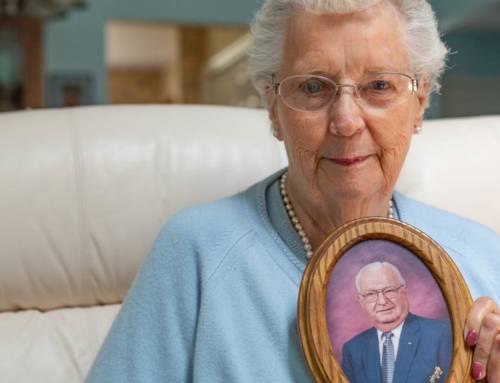
About the Author: Sunday Sermons from Sell Chapel are written by Rev. Preston Van Deursen, Director of Pastoral Care at the Masonic Village at Elizabethtown.
If I were to ask this morning what is the one thing you are most concerned about in your life, I guarantee there would be a large percentage of folks who would say finances or money.
For one reason or another, most people today are concerned about money. It is estimated that 40% of the marriages that fail are the result of conflict over finances. Colleges report that students are forsaking the study of Liberal Arts for courses in accounting, engineering, and business. Newspapers are devoting entire sections to the subject of money. People who just a few years ago were financially illiterate are now following with interest-no pun intended-rates on Certificates of deposit, Money Market accounts, etc. Young couples are being urged to sit down with a financial planner early in their marriage and map out a strategy for achieving their financial goals.
Of course, some people are concerned about money almost to the point of desperation. A mail carrier tells of greeting a four-year-old boy who had planted himself firmly in front of his family’s mailbox and would not budge. With his feet spread wide and his arms folded, he told the mail carrier firmly, “My mom says she can ‘t TAKE any more bills.”
All of us are concerned for one reason or another about money. Jesus knew that. It was no different 2,000 years ago. That is why he had so much to say on the subject. Money is an important part of our lives. Indeed, Jesus noted that we will control our money or it will control us. It will either be a blessing to us or a curse.
Consider the story about a rich man whose land produced so bountifully that he didn’t know what to do with the surplus. Most of us would like to have a problem like that, wouldn‘t we? The man resolved his problem this way, “I will pull down my barns,” he said, “and build larger ones; and there I will store all of my grain and my goods. And I will say to my soul, Soul, you have ample goods laid up for many years; take your ease, eat, drink be merry.” You know the conclusion of the story. That very night God came to him and called him a “fool,” Why? “This night your soul is required of you,” said God, “and the things you have prepared, whose will they be?” Then Jesus adds, “So is he who lays up treasure for himself, and is not rich toward God.”
Isn‘t it interesting that God should call him a fool not a sinner, not a reprobate but a fool? We have to be very careful here. Scholars assure us that parables are designed to make only one point. But the term “fool” suggests all sorts of things to me. Probably not all of them relate to this rich man, but they do relate to some men and women I have known. Let ‘s think of some reasons God may have called him a fool.
FIRST OF ALL, HE MAY HAVE PAID TOO HIGH A PRICE PHYSICALLY, EMOTIONALLY AND SPIRITUALLY FOR HIS GREAT WEALTH. That is certainly a possibility. People have been known to sacrifice their health, their marriage, their relationship with their children, their respect and reputation in the community-people have been known to create all kinds of havoc in their lives in the race to grab the almighty dollar.
This man was, at the least, meeting his maker far sooner than he had expected. It is obvious that he thought he had many years left. Maybe, as we sometimes say, he worked himself to an early grave.
Eric Butterworth, in his book UNITY OF ALL LIFE, tells a somewhat complicated but very revealing story about two men. It is a fictitious story, but if you will follow me, I think the story will appeal to you. As I have already noted, it is about two men.
One was very wealthy but in poor health. The other was quite robust but very poor. The two men were envious of one another. The wealthy man would have given anything for a healthy body. The poor man would have given anything to be rich. There was a world famous surgeon who could give them both what they longed for. He had perfected a technique for doing brain transplants. They were the perfect candidates. The wealthy man gave the poor man all of his wealth for the poor man ‘s robust body by just swapping their brains.
But this is not the end of the story. The operation was a complete success. Now the formerly poor man was surrounded by wealth, but he did not know how to use it. He squandered it on both foolish pleasure and bad investments. Soon he was poor again. However, the sickly body that he had received in the brain transplant became healthy again because he was not burdened with stress and anxiety. Meanwhile the formerly wealthy man with his new robust body began to accumulate wealth again because he knew the principles for making money and he exercised discipline in his spending. Soon he was wealthy again, but the stress and anxiety that he subjected himself to took its toll on his body. Soon he was racked with aches and pains. So, both men ended up back where they started-one wealthy with a sickly body; the other financially impoverished but with excellent health.
I like that story. There is so much of real life in it. Maybe the rich man in our parable was so obsessed with making money that he sacrificed his health or something equally as important to obtain it. That would make him foolish wouldn’t it? That is one possibility. Certainly there is no one in the room who is that foolish, is there?
THERE IS A SECOND POSSIBILITY. MAYBE THE RICH MAN HAD PUT OFF REALLY LIVING UNTIL IT WAS TOO LATE. That little trilogy is so appropriate here-making a living, making a killing, then making a life. That is the way many people perceive the progression that life must take. At first we are satisfied with just making a living. But as our income rises, so do our perceived needs. We need a bigger house, a more luxurious car, a better school for the children. We find ourselves needing more and more. So we have to increase the financial goals we once set for ourselves. We want the kind of life “so worldly, so welcome” that the Master Card ads portray. That means that it is not enough to make a living. We need to make a killing. Someday when the children are grown, and the mortgage is paid, and all of our goals have been reached, we will think about making a life. But what if it is too late when you finally get around to making a life? Wouldn’t‘t that be sad? Wouldn’t‘t that be foolish.
Our rich friend surveys all that he has and he says to his soul, Soul, you have ample goods laid away for many years; take your ease, eat, drink, be merry….It makes me wonder if he had put off living waiting for a tomorrow that never came. That would indeed be foolish. Here all these goods were laid up and somebody else would enjoy them.
THERE IS A THIRD POSSIBILITY, MAYBE GOD CALLED HIM FOOLISH BECAUSE HE NEVER UNDERSTOOD HOW TO GET THE MOST JOY FROM HIS WEALTH. What could you do with your money that would give you the grandest feeling you have ever had? Bear with me for a moment. I sincerely believe that you and I could get more joy from life if we learned to take giving it away more seriously. How much would does it mean to save one child ‘s life? I ‘m not getting you ready for a special offering. But for Heaven ‘s sake, just think about it for a moment. How much would it be worth-five dollars, a hundred, a thousand? Suppose you could take some bills out of your wallet and put them into the offering plate and know that somewhere in the world you had saved one little child’s life? Wouldn’t that make this one of the greatest days in our whole life? I believe if we would just think about it, we would do more not out of guilt but out of gladness.
We have so much. Others have so little. There is a lot of need in this world. Someone put it like this: “Suppose the world were reduced to a global village of one hundred people. Eighty of them would be unable to read, only one of those people would have a college education, fifty would be suffering from malnutrition, and eighty would be found living in houses unfit for human habitation. In this same village of one hundred, six would be Americans who have 3/4ths of the entire income of the village, leaving the remaining ninety four to exist on the other 25 percent.” We have so much. Again my desire is not to make us feel guilty just foolish. The more luxuries that we have, the less they bring us happiness. But to know that we have made a real difference in somebody ‘s life that brings unimaginable joy. That is the third reason God may have called him foolish. He may have never understood how his wealth could bring him the most joy.
THERE IS A FOURTH POSSIBILITY. IT SEEMS To me it might have been THE ONE THAT JESUS HAD IN MIND. THE RICH MAN MAY HAVE BEEN FOOLISH BECAUSE HE DID NOT TAKE INTO CONSIDERATION HIS ACCOUNTABILITY TO GOD. This seems to be the point that Jesus was making with this parable. Consider his concluding remarks: “So is he who lays up treasure for himself and is not rich toward God.”
Many people today are what I would call functional atheists. That is, they may believe in the existence of God, but it makes no real difference in the way they live their lives. They have no sense of their own personal accountability.
What does it mean to be “rich towards God? Protestants have a real bind at this point. We believe that salvation is only by grace and not by works. We have a difficult time when it comes to personal accountability. There have been cruel monsters throughout history who have claimed to be believers. Are they not accountable for their barbaric behavior? Does it not make sense that the great God who granted us the great gift of life, who gave us talent and abilities and opportunities should hold us accountable for the use to which we put them? Wouldn’t it be foolish to assume otherwise?
There is an old story about a very wealthy man who died and went to heaven. An angel guided him on a tour of the celestial city. He came to a magnificent home. “Who lives there?” asked the wealthy man. “Oh,” the angel answered, “on earth he was your gardener.” The rich man got excited. If this was the way gardeners live, just think of the kind of mansion in which he would spend eternity. They came to an even more magnificent abode. “Who ‘s is this?” asked the rich man almost overwhelmed. The angel answered, “She spent her life as a missionary.” The rich man was really getting excited now. Finally they came to a tiny eighty-by eight shack with no window and only a piece of cloth for a door. It was the most modest home the rich man had ever seen. “This is your home,” said the angel. The wealthy man was flabbergasted. “I don ‘t understand. The other homes were so beautiful. Why is my home so tiny?” The angel smiled sadly, “I m sorry,” he said, “We did all we could with what you sent us to work with.”
God called him a fool. Maybe he paid too high a price for his wealth. Perhaps he put off living until it was too late. It could be that this poor rich man never understood that money could ever bring us joy until we use it to show love for another. Or it may be that he simply never realized that ultimately he was accountable for everything in his life-including how he used his money. I know most of us have been doing a lot of financial planning?
Just a thought for this morning , one for each of us to ponder. Could we possibly be making the same mistakes? Perhaps it is not so much a matter of being sinful. Perhaps we are just being foolish.




